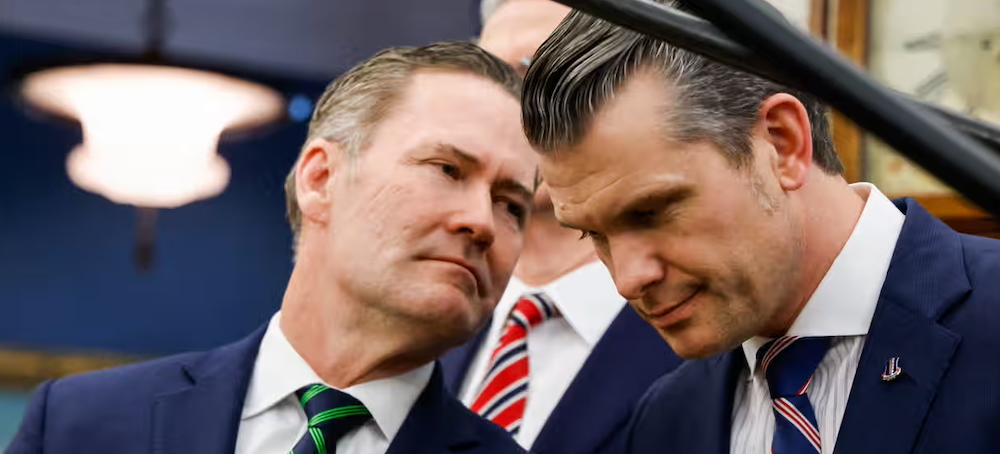Latest Signal Leak Revelations Expose US Officials’ Lies About What Was Shared
Peter Beaumont Guardian UK Pete Hegseth shared details of war planning in an app and on devices he could not be sure were secure. (photo: Ludovic Marin/AFP/Getty Images)
Pete Hegseth shared details of war planning in an app and on devices he could not be sure were secure. (photo: Ludovic Marin/AFP/Getty Images) Latest Signal Leak Revelations Expose US Officials’ Lies About What Was Shared
Peter Beaumont Guardian UK
Trump officials had claimed nothing classified or risking harm to members of the military was shared in the chat
After the vague and evasive assertions by Trump officials at Monday’s Senate intelligence committee hearing, from the White House, and from the US defence secretary, Pete Hegseth, that no war plans or classified material was shared, readers can make up their own minds.
Despite Hegseth’s angry denial, the exchanges in the leaked group chat did contain details of war planning, shared recklessly by him in advance of the attack on 15 March, on a messaging system and perhaps devices which he and others in the chat could not have been certain were secure.
Most damning is the fact that Hegseth sent details in advance of the F-18s and other aircraft that would take part in the attack, including the timing of their arrival at targets, and other assets that would be deployed.
As Ryan Goodman, a law professor who formerly worked at the Pentagon, put it after the latest release: “The Atlantic has now published the Signal texts with attack plans in response to administration denials. I worked at the Pentagon. If information like this is not classified, nothing is. If Hegseth is claiming he declassified this information, he should be shown the door for having done so.”
In attempting to cover up and diminish their culpability for a shocking breach of operational security – including the fact that two participants in the chat were overseas (including one in Moscow at the time) – the Trump administration has made the scandal immeasurably more serious than it was already.
At the most simple level, the pilots who flew on those strikes should rightly be furious that the most senior civilian defence official placed them in harm’s way.
“If this text had been received by someone hostile to American interests – or someone merely indiscreet, and with access to social media – the Houthis would have had time to prepare for what was meant to be a surprise attack on their strongholds. The consequences for American pilots could have been catastrophic,” wrote Jeffrey Goldberg, the Atlantic editor who was accidentally added to the chat.
A question that now needs to be answered is precisely why a group of senior officials, including a number who have served in the US armed forces – including the director of National intelligence, Tulsi Gabbard, the national security adviser, Mike Waltz, the vice-president, JD Vance, and Hegseth – agreed to join a conversation on such a platform.
All of them will be aware of not just the stringent rules around operational security (Opsec in military jargon) but the absolute necessity to protect the lives of those you serve with.
The strong suspicion voiced by a number of commentators is that this group, like other senior officials in the Trump administration, have been using services like Signal to avoid oversight despite potentially being in breach of federal laws on record retention.
In other words, lives were casually put at risk to shirk another significant responsibility of the highest offices: accountability.
What happens next is key.
In any normal circumstances and in any previous era, Hegseth and Waltz would be expected to resign immediately: Hegseth for sharing what any reasonable observer would regard as details of war plans – and then lying about having done so – and Waltz for his shocking sloppiness around security.
But whether or not they will resign or be dismissed by a dysfunctional president, equally hostile to the notion he should be held accountable, is an open question.
What should be clear to already shocked allies of the US is that not only is intelligence and other sensitive material not safe in the hands of Trump’s senior security officials, but that they cannot be counted on to be truthful individually or as a group.
